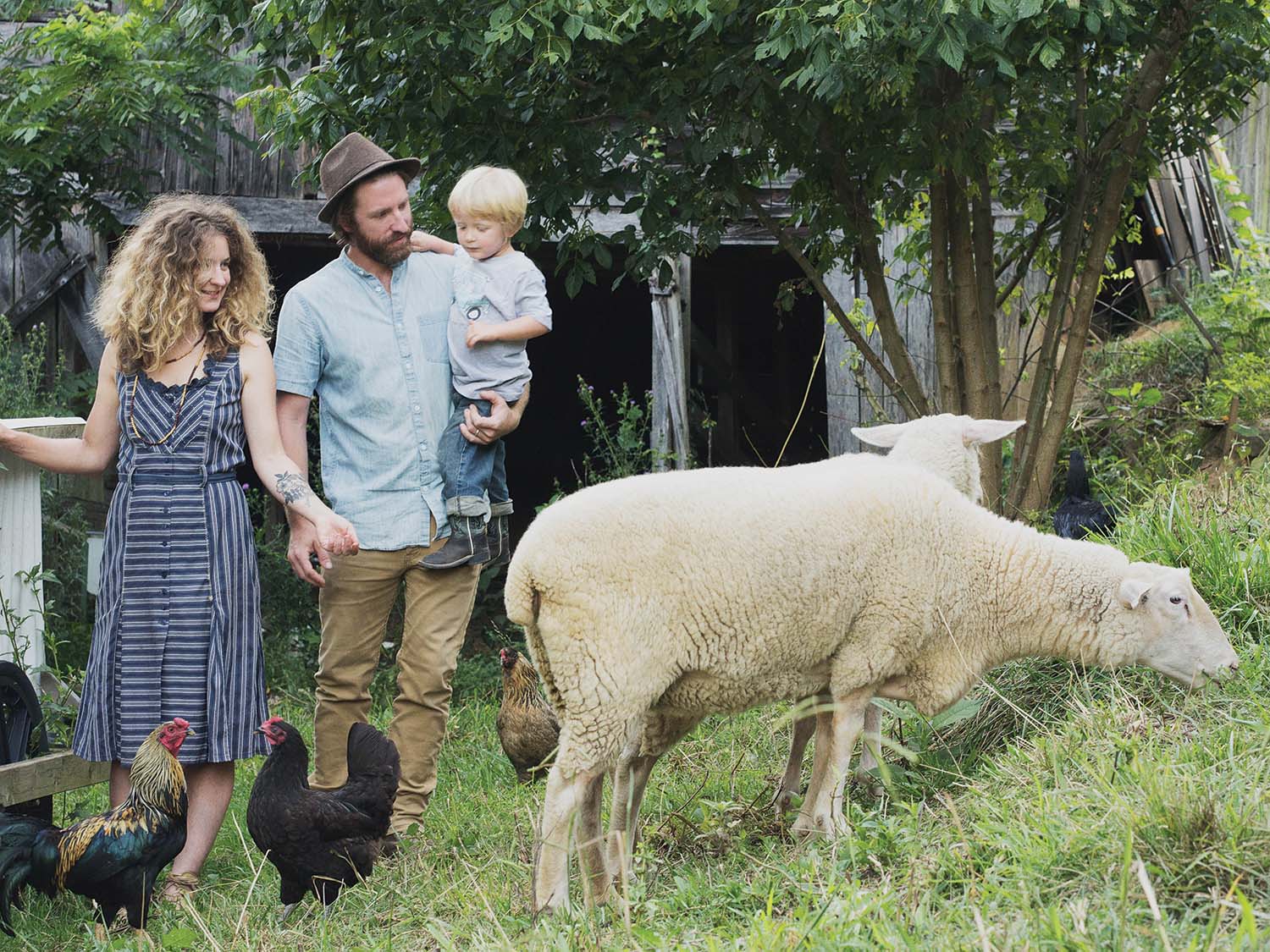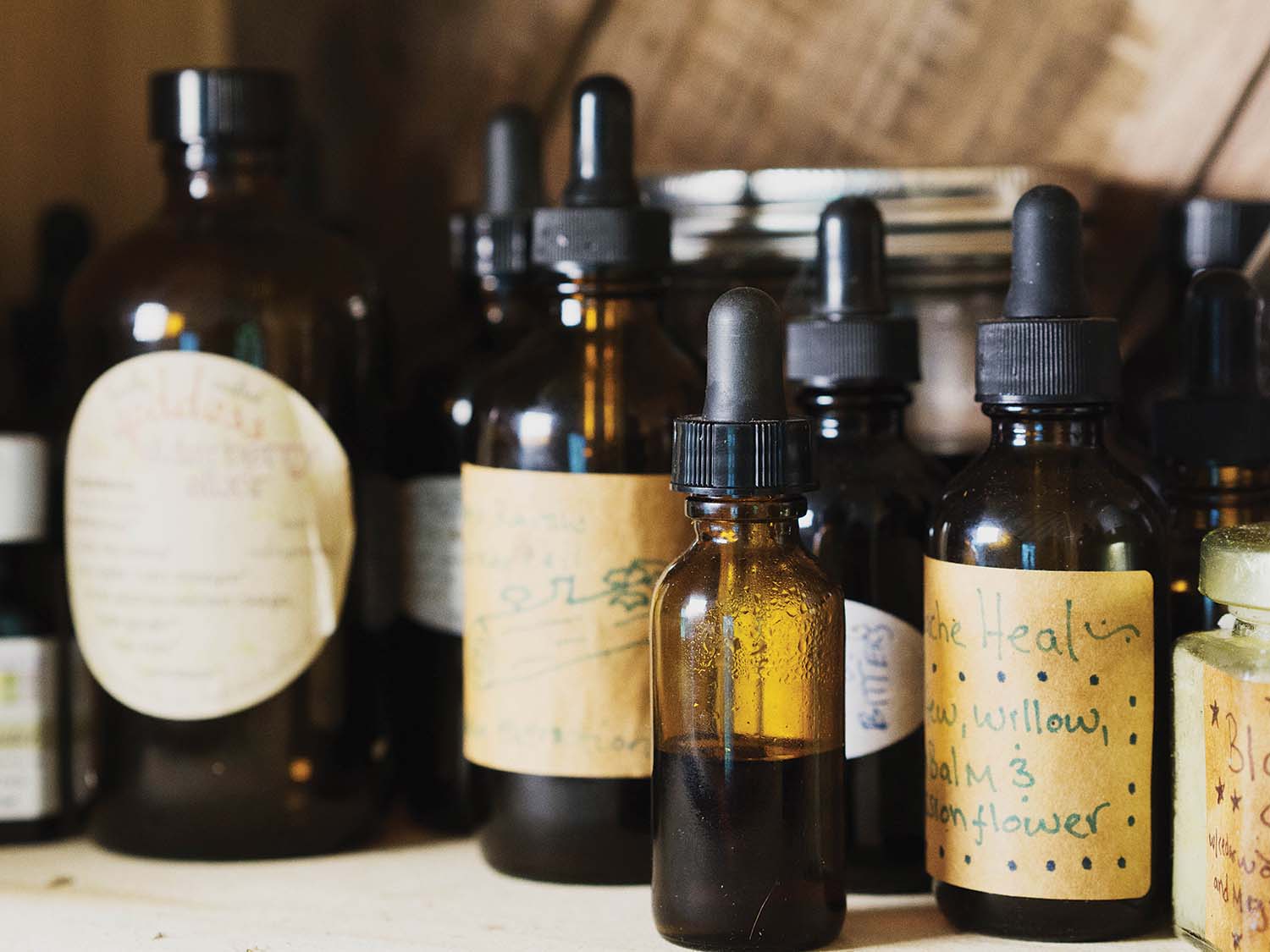
When Hallee Hirsh and Ryan Martin moved to Western North Carolina from Los Angeles, they lived for a while in a tent, pitched on their 28-acre rural Madison County property. They’ve upgraded to a much bigger tent now.
The former Hollywood actors now own Hole Hot Doughnuts and Fresh Coffee in West Asheville and live about half an hour from their business in a 703-square-foot yurt, a circular tent on a wooden framework. Theirs is the more spacious and well-appointed type of yurt, including a kitchen, bedroom, living space, outdoor shower, and porch. It sits at the bottom of a long driveway surrounded by trees, chickens, and a couple of territorial sheep known to butt heads with encroaching vehicles.
A woodstove heats the yurt during the winter, and mountain breezes cool it in the summer. “You don’t want to have trees over it, so you have all of this sun on it and it’s an insulated tent and it’s blazing in July,” Hirsh reveals. “Luckily that’s just during July. Most of the year the yurt is extremely comfortable.”
Nearby is a barn, built in 1962 and used by the family. It’s where the refrigerator and compost toilet are and where the best Wi-Fi reception is. There’s no TV in the yurt; if the couple watches any shows, they do so on a laptop or a tablet.
And yet Hirsh was once a well-known child actor who had a role in the Tom Hanks hit You’ve Got Mail. She was nominated for a Young Artist’s Award for her work in Law & Order; played Rachel Greene on another long-running ’90s TV series, ER; and was a cast member in the Discovery Kids series Flight 29 Down.

Hirsh and Martin — who appeared in the movies Infiltrators and Relapse and who recently acted with Asheville’s Montford Park Players — have a three-year-old son named August; they moved to Western North Carolina shortly after he was born. Once settled in the mountains, they opened Smoky Holler Sourdough Tortillas, which served several locations, before they purchased Hole Doughnuts.
Why here?
Ryan: We zeroed in on it pretty quickly. We wanted four seasons, mountains, water, community, and land. We wanted a different culture … the Appalachian culture is really cool and there’s a lot of stuff to learn from that.
Hallee: People are really, really crafty and there’s so many people to learn from. Ryan learned how to make brooms and I learned how to tan hides. I’m learning herbalism and permaculture and homesteading from people who are in different stages of learning themselves. We’re used to cities and I’m used to learning these things from books. I have this huge library of things and I don’t even open those books anymore because I have this incredible community to turn to.
Life’s a lot different here than in L.A. …
Hallee: Totally, but it’s so much more welcoming. L.A. was such a fight. Always waiting for someone to want you and waiting for the phone to ring. Always hustling, hustling, hustling. I grew up in that world and was lucky to have some success as a child actor. But I went to UCLA and studied cultural anthropology and a little bit of Chinese and I traveled, and I got a perspective on things that widened my dreams.
How has parenting changed you?
Hallee: In every way. He was a big reason we moved out of Los Angeles. Because of him, we wanted to get serious about what we actually want in life and pursue it so he could be a part of that and so he could grow up in a culture and community that supports the values we have. It turned any auxiliary pursuits into nothing and changed our lives.
Why a yurt?
Hallee: It was within our abilities and within our budget. It was closer to the sounds and elements of where we live. We liked the idea of having a small home that helped us purge the excess and keep the stuff out so we can keep our time devoted to what’s important to us — which is our work, our son, and learning to make things instead of knowing how to buy things. We have dreams of a more rustic abode. We have dreams of building an earthen home out of straw bails and cob or a mixture of other materials. There are a lot of people up to that around here so we can look at what’s working and decide if those are mediums we want to build with in the future — or maybe we’ll decide on a more traditional timber-frame house. We see this as a temporary living situation. There’s a 20-year warranty.
How did you end up owning a doughnut shop?
Hallee: The former owner saw we were interested in growing our tortilla business. She saw us as likely candidates and saw we had the same vision of what she was doing, which was focusing on high-quality flour, oil, and sugar, not cutting corners in any way and giving our employees a living wage. She knew we saw eye-to-eye.
Favorite type of doughnut?
Ryan: I guess plain. Do you mean ours or another doughnut place? We’re not biased, [but] Hole Donuts were our favorite before we bought the business.
Hallee: We were very loyal customers. We would eat seven doughnuts a week. We’d go get a baker’s half-dozen and Ryan would eat four and I’d eat three. Then our child was old enough to eat one and then Ryan would eat three and I’d eat three. I asked for a job there because we were so obsessed with the place.
Can you find any similarities between acting and doughnut making?
Hallee: Because it’s an open kitchen and every doughnut is made to order, it scratches the performance itch. We’re a spectacle. People come in, order their doughnuts, and they have to wait so they watch. We’re constantly on stage doing that. We’re creating a spectacle of delight for people. It’s almost like theater, in a way. There’s an attention to detail. The thing that is unlike acting is the repetitive nature of it.
